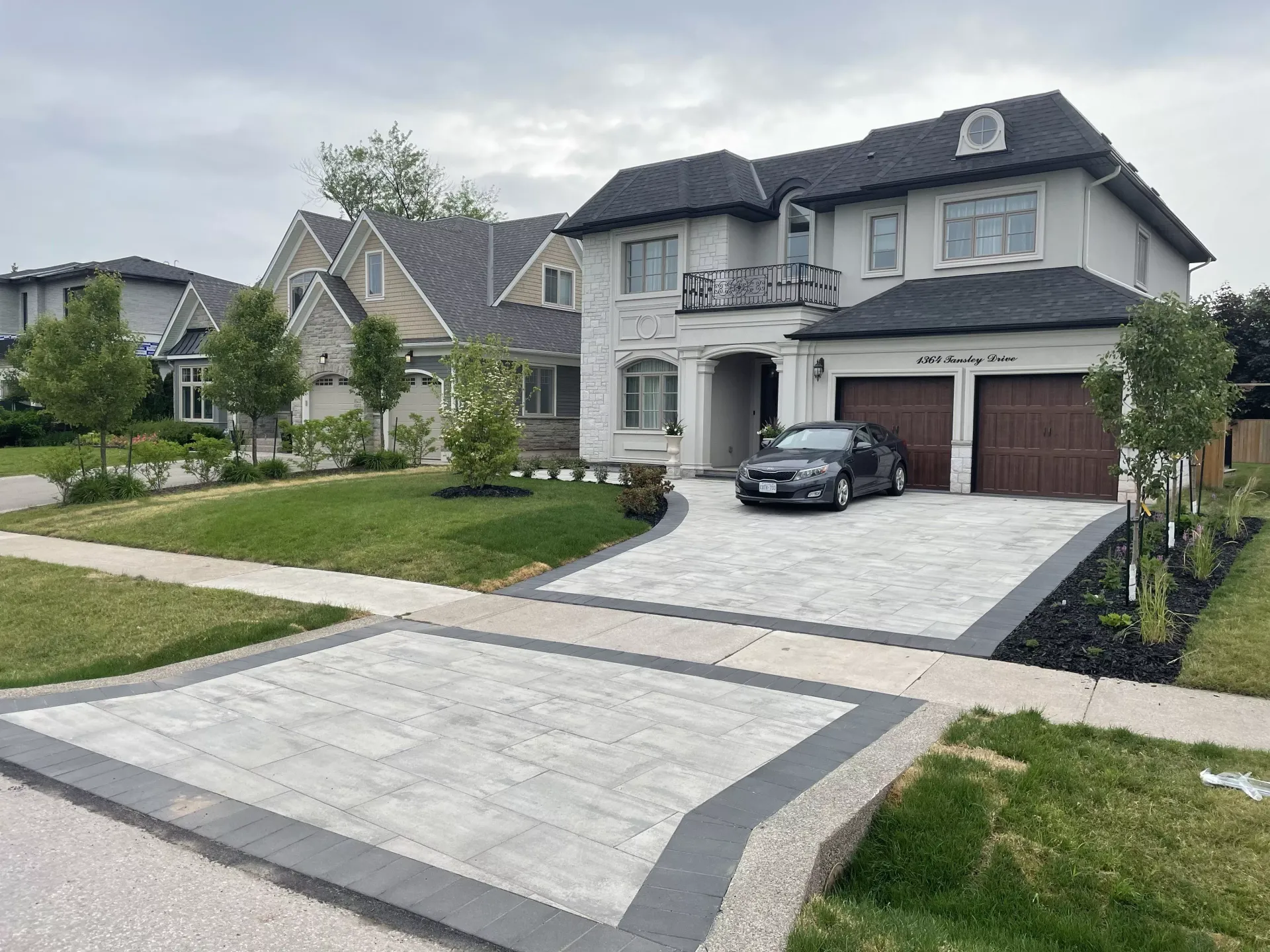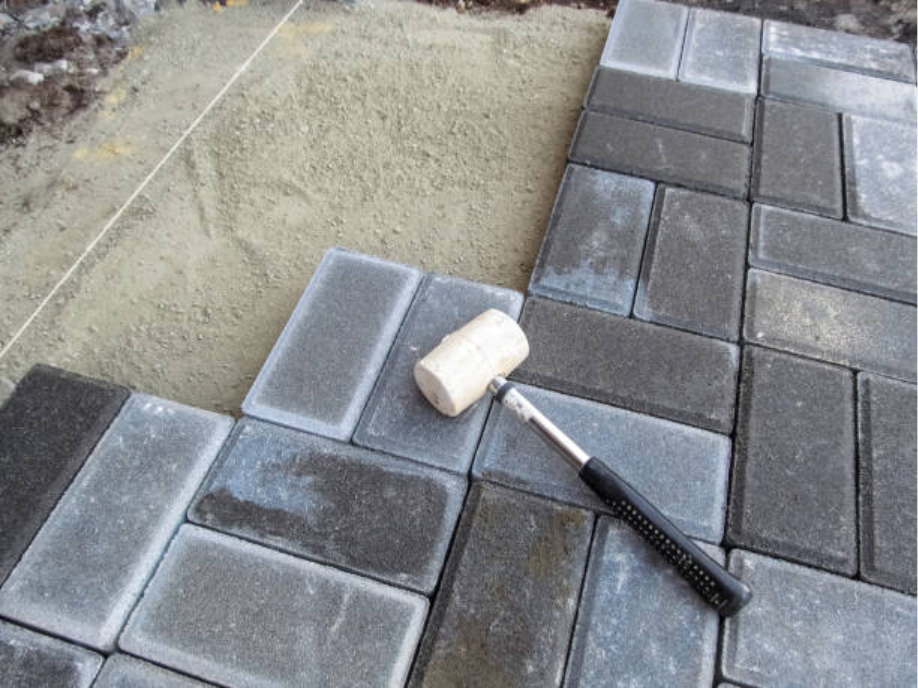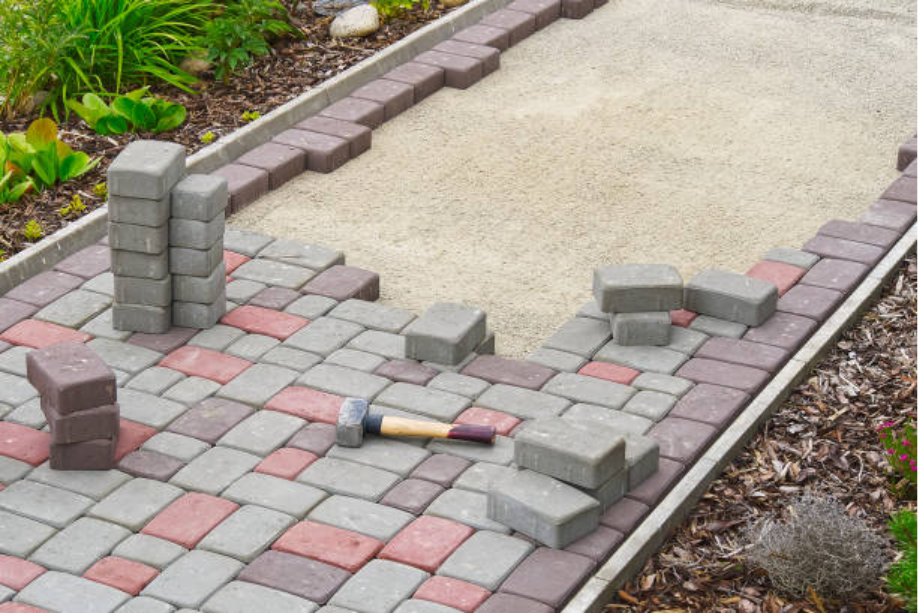Best Pavers for Driveway

Choosing the Best Pavers for Driveway
Selecting the perfect pavers for your driveway is an investment in both function and curb appeal. In Ontario’s challenging climate—where freeze-thaw cycles, heavy rains and occasional heat waves all take their toll—your choice of driveway pavers can mean the difference between a surface that lasts decades and one that requires constant repairs. This 1,500-word guide will walk you through the most popular paver materials, performance considerations, aesthetic choices, installation essentials, and maintenance tips so you can confidently choose the right pavers for your driveway.
Introduction to Driveway Pavers
Driveway pavers are a popular choice for homeowners looking to enhance their home’s curb appeal and create a durable, low-maintenance driveway. Available in a variety of materials such as concrete pavers, brick pavers, and natural stone pavers, these options offer a wide range of styles, textures, and colors to suit any home’s exterior. Whether you’re replacing an existing driveway or installing a new one, driveway pavers provide a stylish and practical solution. Designed to withstand heavy loads and support heavy vehicles, they are built to last, making them a smart investment for any homeowner. With their ability to create unique and visually appealing driveways, pavers are an excellent choice for driveway landscaping.
Why Paver Selection Matters
Your driveway is more than just a path from the street to your garage. It’s a focal point that welcomes guests, protects your vehicles, and directly impacts your home’s resale value. The ideal paver not only complements your home’s architectural style but also withstands tire loads, resists moisture intrusion, and maintains its appearance year after year.
Many homeowners focus solely on upfront costs, only to discover later that inexpensive pavers can crack under weight, fade in sunlight, or allow weeds to sprout through worn-out joints. By understanding the full lifecycle of your chosen material—including installation and maintenance—you ensure a driveway that looks great, functions reliably, and delivers a solid return on investment. Understanding the full lifecycle of your chosen material is crucial for ensuring a durable and aesthetically pleasing driveway.
Common Driveway Paver Materials
Concrete Pavers
Concrete pavers are molded under high pressure and cured to achieve consistent shape and strength. They’re available in a spectrum of colors, textures and finishes, from smooth and modern to tumbled and rustic. Because they interlock, individual pavers can flex slightly under vehicle loads without cracking, and damaged units are easy to replace.
Key benefits:
- -Wide range of colors and styles
- -Uniform sizing for quick installation
- -Cost-effective, typically $10–$25 per square foot installed
Natural Stone Pavers
Natural stones such as flagstone, bluestone, granite, and limestone bring an organic, high-end look to driveways. Each stone is unique in hue and veining, giving your driveway a one-of-a-kind character. Granite offers the greatest durability, while flagstone and limestone provide more texture but may require sealing to resist staining.
Key benefits:
- -Timeless, premium appearance
- -Exceptional hardness (especially granite)
- -Long lifespan, often 50+ years
Brick Pavers
Clay brick pavers lend traditional warmth with their rich reds, tans and browns. Fired in kilns, they resist fading and are naturally water-resistant. While bricks may shift more than concrete pavers if the base isn’t perfectly uniform, they continue to be a favorite for heritage and craftsman-style homes. Cobblestone-inspired brick pavers can further enhance the traditional and rustic appeal of a driveway, combining the aesthetic charm of European streets with modern durability.
Key benefits:
- -Classic, enduring aesthetic
- -Natural color retention
- -Slip resistance when textured
Porcelain Pavers
A modern newcomer, porcelain pavers are kiln-fired with low absorption rates and virtually no color fading. They mimic stone or concrete finishes and resist stains, scratches and freeze-thaw damage. Proper edge restraint and a compacted base are essential, as porcelain can be more brittle under heavy loads. Additionally, porcelain pavers resist damage even when exposed to harsh environmental conditions.
Key benefits:
- -Ultra-low maintenance
- -Fade-proof, stain-proof surface
- -Sleek, contemporary look
Performance Factors to Consider
When evaluating paver options, consider these critical performance attributes for Ontario driveways:
- -Load-Bearing Capacity
Your driveway must support passenger vehicles, trucks and seasonal equipment without cracking. Opt for pavers at least 60–80 mm thick, and ensure your installer compacts an 8–12 inch aggregate base to distribute weight evenly. - -Freeze-Thaw Resistance
Moisture trapped in pavers or joint sand can freeze, expand and cause surface spalling. Look for pavers rated for freeze-thaw climates (many concrete and brick manufacturers offer air-entrained mixes), or choose naturally dense materials like granite or porcelain. - -Slip Resistance
Driveways can become slippery when wet or icy. Textured surfaces—whether sand-blasted concrete, cleft natural stone or grooved brick—provide extra traction and improve safety during Ontario’s wet springs and frosty winters.
Aesthetic & Design Choices
Your driveway sets the tone for the entire property and enhances the beauty of your home. Keep these design tips in mind:
- -Color Coordination: Match or complement your home’s exterior palette. Cool-tone grays and charcoal suit modern façades, while warm reds and tans echo brick or wood accents.
- -Pattern Selection: Running bond is simple and economical, while herringbone (at 45° or 90°) locks pavers together tightly under traffic. Basket-weave or circular patterns add visual interest but require more cutting and labor.
- -Borders & Accents: A contrasting border paver can frame the driveway, lend definition and prevent edge shifting. Inlays—such as a stone medallion near the garage—create custom focal points.
- -Integration with Landscaping: Soften hard edges with planting strips, low walls or groundcover between paver sections. Permeable joints filled with stone mulch also support moss or creeping thyme for a cottage-style look.
Benefits of Pavers
Pavers offer numerous benefits that make them an attractive choice for driveways. Their durability ensures they can withstand heavy loads and resist cracking, providing better longevity compared to other materials like asphalt or poured concrete. Pavers are also easy to repair; if one becomes damaged, it can be replaced without disturbing the surrounding area. This modularity allows for creative designs and patterns, enhancing the aesthetic appeal of your driveway. Additionally, pavers come in a wide range of colors, shapes, and textures, allowing you to create a driveway that perfectly complements your home’s exterior. By choosing pavers, you not only improve your home’s curb appeal but also increase its overall value.
Installation Essentials
Even the finest pavers will underperform if installed improperly. A standard installation includes:
- -Excavation: Remove topsoil, vegetation and any existing pavement to the required depth—typically 8–12 inches below the finished grade.
- -Subgrade Preparation: Compact the native soil to provide a stable foundation.
- -Aggregate Base: Spread 4–6 inches of crushed stone or gravel, moisture-conditioned and compacted in layers.
- -Bedding Layer: Screed 1 inch of coarse sand or stone dust to achieve the exact pitch (1–2% slope away from the house).
- -Paver Laying: Install pavers starting from a straight edge, working outward and inserting edge restraints to secure the perimeter.
- -Compaction & Jointing: Pass a plate compactor with a neoprene mat over the surface, then sweep in polymeric or jointing sand and mist to lock pavers in place.
- -Sealing (Optional): Apply a breathable sealant to protect porous materials from staining and freeze-thaw damage.
Pavers offer significant advantages over traditional concrete slabs, providing enhanced durability and aesthetic appeal, making them a superior choice for driveways and walkways.
Most professional installations for a standard 300 sq ft driveway take about 5–7 days on-site, depending on pattern complexity and site accessibility.
Paver Accessories and Sealers
To maximize the performance and lifespan of your driveway paving, consider incorporating accessories and sealers. Edge restraints are essential for keeping pavers in place and preventing shifting over time. Joint sand, particularly polymeric sand, helps lock pavers together and inhibits weed growth. Applying a sealer to your pavers can protect them from stains, weathering, and freeze-thaw damage, ensuring they maintain their appearance and functionality for years to come. Sealers come in various finishes, from matte to glossy, allowing you to choose the look that best suits your driveway. By investing in these accessories, you enhance the durability and aesthetic appeal of your paver driveway.
Budgeting & Cost Overview
Your per-square-foot cost depends on material, pattern complexity and site conditions, with different materials being suitable for various budget ranges and aesthetic preferences:
- -Concrete Pavers: $10–$25 per sq ft installed
- -Brick Pavers: $15–$30 per sq ft installed
- -Natural Stone: $20–$50 per sq ft installed
- -Porcelain Pavers: $25–$45 per sq ft installed
Remember to account for excavation, base materials, edge restraints and any necessary drainage solutions, which can add $5–$10 per sq ft. To manage costs:
- -Mix Materials: Use budget-friendly concrete pavers for the bulk, with natural stone accents near the garage or entry.
- -Phase Add-Ons: Install the main driveway first; add borders, inlays or lighting later.
- -Shop Multiple Quotes: Compare at least three itemized estimates, and verify that base preparation and permits are included.
Maintenance for Longevity
Proper upkeep ensures your driveway looks great and performs reliably, extending the life of your pavers:
- -Regular Cleaning: Sweep away grit and debris to prevent joint erosion. Annual pressure-washing refreshes colors and removes mildew.
- -Joint Replenishment: Over time, polymeric sand may wash out; sweep in fresh joint sand and mist to re-lock the pattern.
- -Sealing: For natural stone and some concrete pavers, reseal every two to three years to protect against stains and freeze-thaw damage.
- -Spot Repairs: Keep extra pavers from your original batch on hand. Lift and replace any cracked or heavily stained units without disturbing the surrounding area.
Common Mistakes to Avoid
When selecting and installing pavers for your driveway, avoiding common mistakes can save you time, money, and frustration. One major pitfall is skimping on base preparation; a poorly compacted base can lead to settling and cracking. Ensure your installer uses a sufficient depth of compacted aggregate to support heavy loads. Another mistake is choosing pavers based solely on price; cheaper options may not offer the durability or aesthetic appeal you desire. Additionally, neglecting proper drainage can result in water pooling and erosion. Finally, failing to maintain your pavers, such as not replenishing joint sand or sealing the surface, can reduce their lifespan and appearance. By being mindful of these potential issues, you can ensure a successful and long-lasting paver driveway installation.
DIY vs. Professional Installation
While small pathways can be a fulfilling DIY project, driveway installations involve heavy machinery, precise grading, and vehicle-load engineering. Professional installation can elevate the quality and appearance of your driveway. Professionals offer:
- -Guaranteed Compaction: Proper base prep prevents future settling and cracking.
- -Warranty Coverage: Labor and material warranties protect you if issues arise.
- -Efficient Scheduling: Skilled crews coordinate excavation, material deliveries, and permit inspections to keep your project on track.
Making Your Final Decision
Your driveway paver choice should align with your home's exterior, balancing aesthetics, performance, and budget. Concrete pavers deliver versatility and economy; brick offers timeless charm; natural stone provides unmatched character; porcelain brings low-maintenance modernity. Whichever material you select, prioritize a thoroughly engineered base, reliable drainage, and precise installation to withstand Ontario’s seasons.
Ready to transform your driveway? For expert guidance on paver selection, design, and installation tailored to your home’s style and climate conditions, contact Wilson Hardscape. Our experienced team will help you create a durable, beautiful driveway that enhances your property’s curb appeal and stands the test of time.




